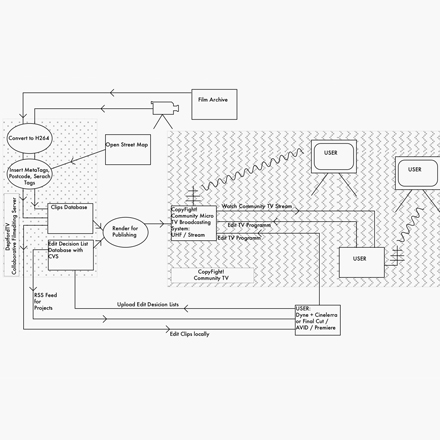"Deptford.TV – strategies of sharing”
What Is Deptford.TV?
• A platform for collaboration with a focus on Deptford communities. (Elvira)
• A collaborative environment for film-making on the Deptford regeneration that accommodates different levels of participation and engagement. A community project. (Bitnik)
• A pool of clips. (Stephen)
• A grassroots media project. (Camden)
• A public access media project that investigates into new areas such as collaborative film editing. (James)
• A project that aims to generate shared resources by uploading materials which people will be able to share. (Gordon)
• A collaborative film - a project on issues of regeneration. (Amanda)
Deptford.TV (1) is a research project on collaborative film-making in collaboration with Deckspace media lab (2), Bitnik collective (3), Boundless (4), Liquid Culture (5) and Goldsmiths College (6). It is an online media database documenting the regeneration process of Deptford, in South- East London. Deptford.TV functions as an open, collaborative platform that allows artists, filmmakers and people living and working around Deptford to store, share, re- edit and redistribute the documentation of the regeneration process. The open and collaborative aspect of the project is of particular importance as it manifests a form of liberated media practice. In the case of Deptford.TV this aspect is manifested in two ways: a) audiences can become producers by submitting their own footage, b) the interface that is being used enables the contributors to discuss and interact with each other through the database. Deptford.TV is a form of 'television', since audiences are able to choose edited 'timelines' they would like to watch; at the same time they have the option to comment on or change the actual content. Deptford.TV makes use of licenses such as the creative commons (7) and gnu general public license (8) to allow and enhance this politics of sharing.
1 See http://www.deptford.tv
2 See http://dek.spc.org/
3 See http://www.bitnik.org/en/
4 See http://www.boundles.coop
5 See http://www.liquidculture.info
6 See http://www.goldsmiths.ac.uk
7 Creative Commons is a nonprofit organisation that offers flexible copyright licenses for creative works. See http://creativecommons.org
8 The Gnu General Public License aims to guarantee everybody's freedom to share and change free software. See http://www.gnu.org/copyleft/gpl.htm
|
